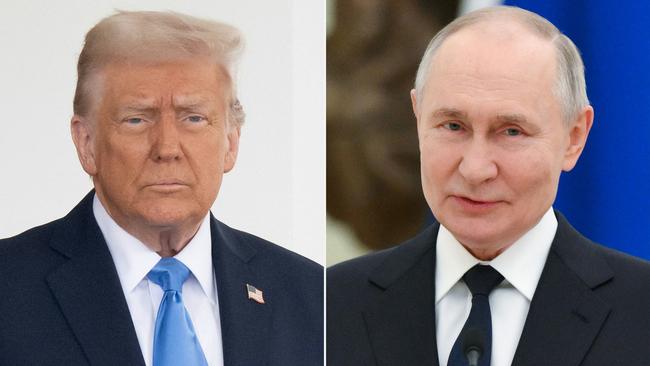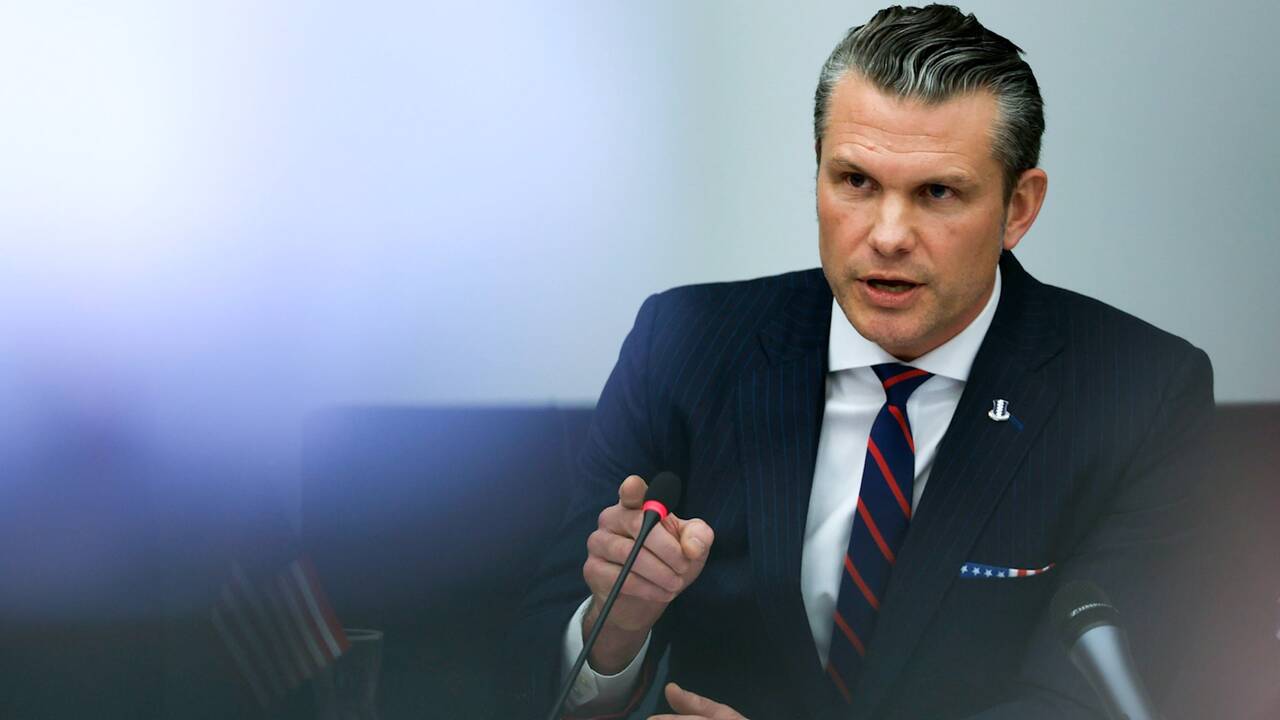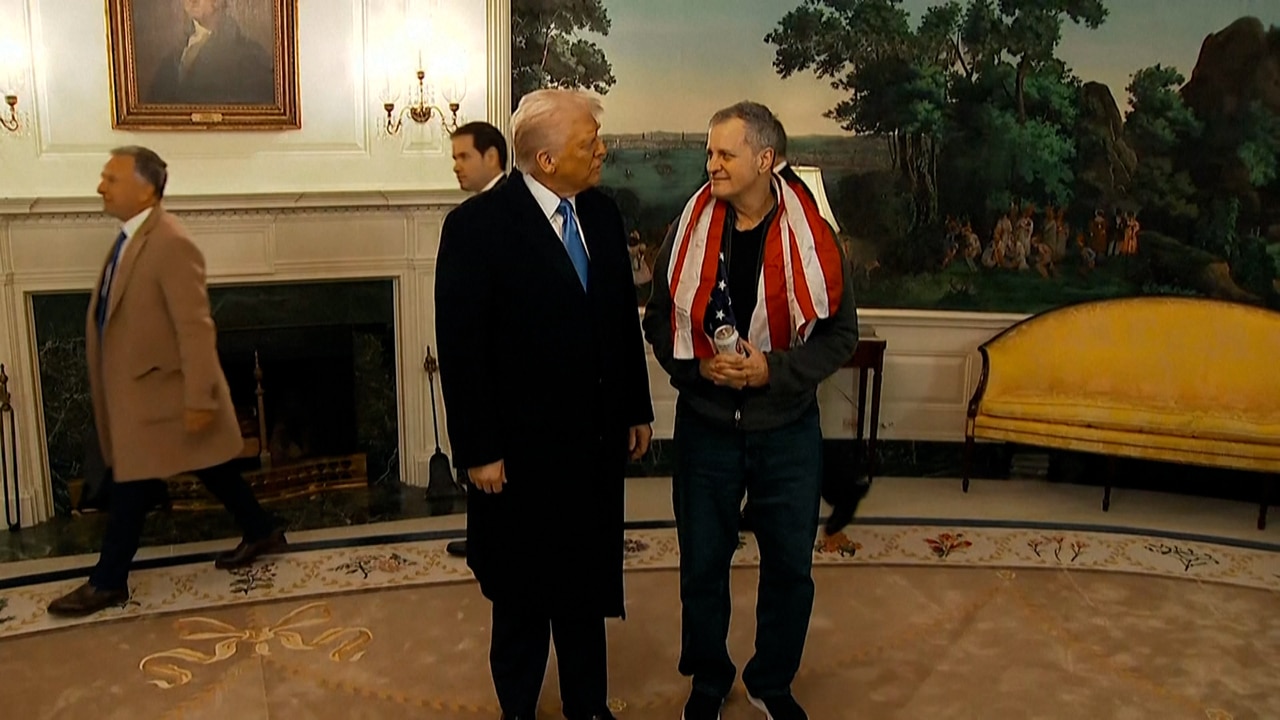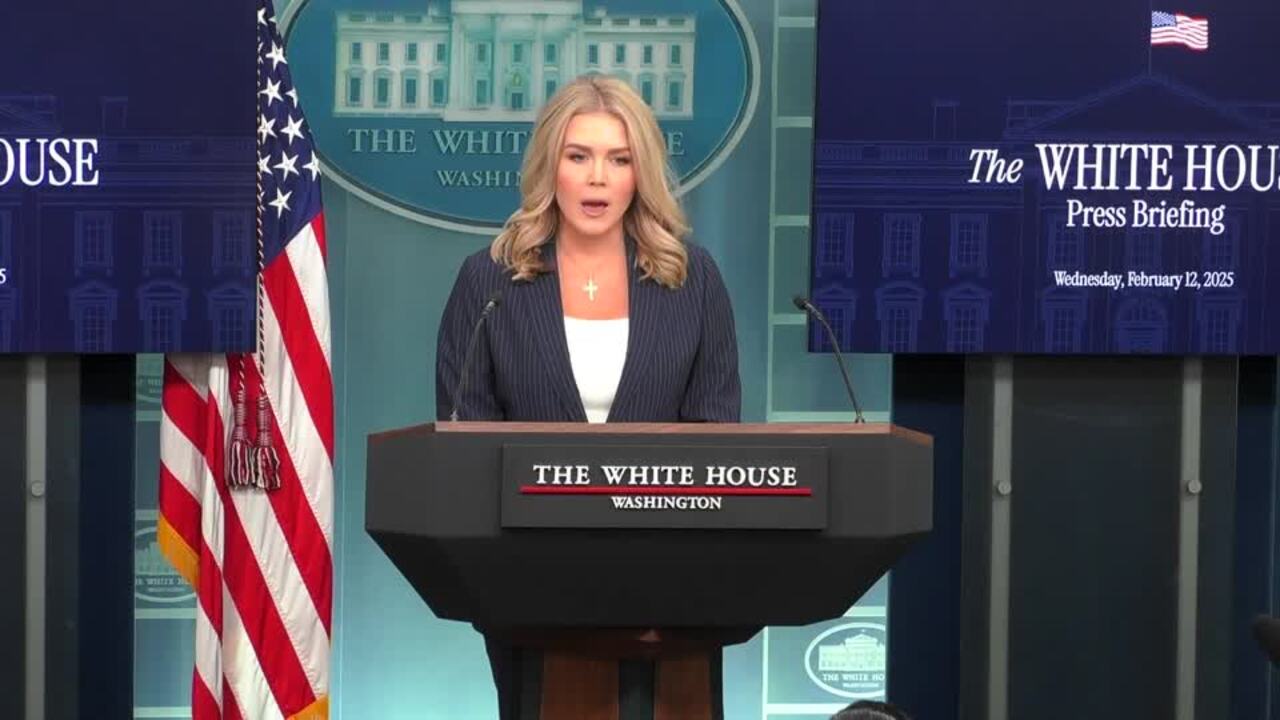Trump, Putin to meet in Saudi for Ukraine peace talks
Donald Trump says a ceasefire in Ukraine will be achieved ‘in the not too distant future’ but it’s not ‘practical’ for Ukraine to join NATO: Hegseth says return to pre-2014 borders is ‘unrealistic’.

Donald Trump and Vladimir Putin will meet in Saudi Arabia to discuss a ceasefire in Ukraine, with Mr Trump saying he could see a truce achieved in the “not to distant future.”
However Mr Trump told reporters he didn’t think it was “practical” for Ukraine to have NATO membership, although he conceded the country “could get some land back” from Russia.
Mr Trump and Mr Putin earlier agreed to “immediately” begin talks aimed at ending the war in Ukraine, with the US President already assembling a negotiating team following a phone call with the Russian leader which he described as “lengthy and highly productive.”
Mr Trump said that both leaders had also agreed to visit each other’s countries and had “reflected on the Great History of our Nations, and the fact that we fought so successfully together in World War II.”
Mr Trump has also spoken to Ukraine President Volodymyr Zelensky, and said a meeting would take place in Munich on Friday (local time).
Posting on his Truth Social media platform, the US President said he was asking his Secretary of State Marco Rubio, CIA Director John Ratcliffe, National Security Adviser Mike Waltz and his Middle East Special Envoy Steve Witkoff to lead the negotiations.
Mr Trump said he was confident the negotiations would be successful and revealed his discussions with Mr Putin covered the Ukraine conflict as well as “the Middle East, Artificial Intelligence, the power of the Dollar, and various other subjects.”

“We both agreed, we want to stop the millions of deaths taking place in the War with Russia/Ukraine,” Mr Trump said. “President Putin even used my strong campaign motto of, “COMMON SENSE.” We both believe very strongly in it. We agreed to work together, very closely, including visiting each other’s Nations.”
He said his conversation with Mr Zelensky also “went very well” and that Mr Zlenesky also “wants to make PEACE.”
“We discussed a variety of topics having to do with the War, but mostly, the meeting that is being set up on Friday in Munich, where Vice President JD Vance and Secretary of State Marco Rubio will lead the Delegation,” he said.
— Elon Musk (@elonmusk) February 12, 2025
“I am hopeful that the results of that meeting will be positive. It is time to stop this ridiculous War, where there has been massive, and totally unnecessary, DEATH and DESTRUCTION. God bless the people of Russia and Ukraine!”
He added: “Millions of people have died in a War that would not have happened if I were President, but it did happen, so it must end.
“No more lives should be lost! I want to thank President Putin for his time and effort with respect to this call.”
The announcement comes after the Trump Administration secured the release of US teacher Marc Fogel who had been detained in Russia in August 2021 on charges of bringing medicinal marijuana into the country.

The release was brokered by Mr Witkoff – a billionaire real estate executive and close friend of Mr Trump – who flew Mr Fogel out the country on his own plane after negotiating the deal in secret.
Mr Trump posted on his Truth Social platform that he thanked Mr Putin for his “time and effort with respect to this call, and for the release, yesterday, of Marc Fogel, a wonderful man that I personally greeted last night at the White House.”
“I believe this effort will lead to a successful conclusion, hopefully soon.”
Zelensky demands ‘just peace’
Shortly after speaking to Mr Trump, Mr Zelensky said the call was “very substantive” and that he and Trump had discussed “many nuances -- diplomatic, military and economic”.
“We believe America’s strength is enough -- together with us, together with all our partners -- to push Russia and Putin to peace,” he said.
Andriy Yermak, head of Ukraine’s presidential office, said on television news that Mr Zelensky stressed to Mr Trump that the war must end “in a just peace”.
He also said Ukraine’s “independence, territorial integrity and sovereignty” cannot be subject to any compromise.
Mr Yermak said Mr Trump and Mr Zelensky had “agreed to immediately start the work of the teams” -- the high-level officials from each side who will try to hash out a deal.
The teams will “begin a process of daily work” and Mr Zelensky and his officials will meet US officials involved at the Munich Security Conference in a day’s time, Mr Yermak said.
He said the two sides are also working on organising a personal meeting between Mr Zelensky and MR Trump that he expects “will take place very soon”.
NATO membership ‘unrealistic’
US Defence Secretary Peter Hegseth made clear the Trump administration did not believe that NATO membership was a realistic outcome for Ukraine from any negotiated settlement, and there could be no return to the country’s pre-2014 borders. US troops would also not be deployed to the country.
Delivering his opening remarks at the 26th meeting of the Ukraine Defence Contact Group in Brussels, Mr Hegseth said America wanted a “sovereign and prosperous Ukraine.”
“But we must start by recognising that returning to Ukraine’s pre-2014 borders is an unrealistic objective. Chasing this illusionary goal will only prolong the war and cause more suffering,” he said.
“Our message is clear - the bloodshed must stop and this war must end.”
Mr Hegseth said a durable peace for Ukraine needed to include robust security guarantees to ensure the war would not begin again.
“That said, the United States does not believe that NATO membership is a realistic outcome of a negotiated settlement,” he said. “Any security guarantee must be backed by capable European and non-European troops.”
“If these troops are deployed as peacekeepers to Ukraine at any point, they should be deployed as part of a non-NATO mission and they should not be covered under Article V. There also must also be robust international oversight of the line of contact,” he said. “To be clear, as part of any security guarantee, there will not be US troops deployed to Ukraine.”
He said that safeguarding European security needed to be a priority for “European members of NATO.”
“As part of this, Europe must provide the overwhelming share of future lethal and non lethal aid to Ukraine. Members of this contact group must meet the moment,” he said. “This means donating more ammunition and equipment, leveraging comparative advantages, expanding your defence industrial base and importantly levelling with your citizens about the threat facing Europe.”

Mr Hegseth said this would involve increasing defence spending. “Two per cent is not enough. President Trump has called for five per cent and I agree. Increasing your commitment to your own security is a down payment for the future.
“President Trump has been clear with the American people ... that stopping the fighting and reaching an enduring peace is a top priority … He intends to end this war by diplomacy by bringing both Russia and Ukraine to the table.”
Mr Hegseth said that lower energy prices and more effective enforcement of energy sanctions would force Russia to the negotiating table.
He said the United States was absorbed with “consequential threats” to its own security along its borders and in its dealings with China which he said “had the capability and intent to threaten our homeland and core national interests in the Indo Pacific.”
“The US is prioritising deterring war with China in the Pacific,” he said. “Deterrence cannot fail for all of our sakes.
“European allies must lead from the front. Together we can establish a division of labour that maximises our comparative advantages in Europe and (the) Pacific respectively,” he said. “We ask each of your countries to step up on fulfilling the commitments that you have made.”
Mr Hegseth said the United States remained “committed to the NATO alliance and to the Defence partnership with Europe. Fullstop.”
“But the US will no longer tolerate an imbalanced relationship which encourages dependency,” he said. “Honesty will be our policy going forward. But only in the spirit of solidarity.”
Conditions ‘favour Russia’
Experts told The Australian the conditions put forward by America for a negotiated settlement to end the war in Eastern Europe favoured Russia rather than Ukraine because the US had far more influence over Kyiv than Moscow.
Daniel Byman, the director of the Warfare, Irregular Threats and Terrorism program at the Centre for Strategic and International Studies, told The Australian that a downgrading of Washington’s relationship with Kyiv was now very likely.
He also questioned how effective the US terms for any negotiated peace to end the war - including no return to Ukraine’s pre-2014 borders and no NATO membership for the war torn country - would prove to be in the long-term.
“Both of these conditions favour Russia,” he said. “One of the Ukraine’s biggest worries is that if it makes peace, Russia will come back in five years — rearmed and ready — and invade again. NATO membership would guard against that. On the 2014 borders, allowing annexation would reward Russian aggression,” he said. “However, Ukraine currently has little chance of reversing all of Russia’s territorial gains on its own.”
Dr Byman said that negotiating an end to a bloody war was always difficult, but suggested there were still glimmers of hope. “The parties are exhausted by years of bitter fighting. Moreover, the United States has tremendous leverage over Ukraine given its large-scale military and financial aid. So the United States can push Ukraine hard, though it has less influence over Russia.”
Dr Byman said the focus by America on encouraging Europe to provide more lethal and non-lethal assistance to Ukraine suggested that a downgrading of Washington’s relationship with Kyiv was “certainly possible, and I would say likely.”
“President Trump believes Europe should ‘step up’ and believes that US money is being wasted in Ukraine.”



